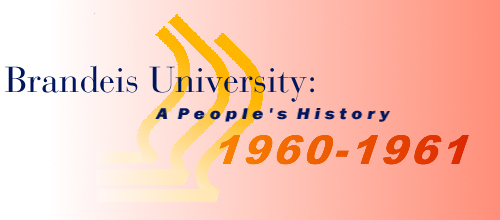1960-1961

Periodically throughout its short history, Brandeis’ identity as an institution sponsored by the American Jewish community has raised unique problems. In its October 3rd issue Life magazine published an article assessing colleges and universities across the country, based largely on interviews with high school guidance counselors. Although the article found that Brandeis “will eventually become one of the nation’s best,” it also warned prospective Jewish students against applying here. The university, Life alleged, was discriminating against Jewish applicants in order to foster a more non-sectarian image.
President Sachar responded quickly and forcefully: “Brandeis is, of course, open to everyone, irrespective of color, creed or ethnic origin, and I doubt that any self-respecting American would want it to be different.” He went on to affirm that, in spite of the article’s allegations, Brandeis’ Jewish atmosphere was “strong and patent,” and remained an enduring source of pride to its students and faculty.
—Staff
As if to emphasize the university’s close ties to the Jewish community, the Hiatt Brandeis-in-Israel program, an overseas-study project under the direction of Dr. Howard Sachar, professor at Stanford University (and son of the president) got underway in the second semester. In February, a group of 12 Brandeis students were selected to participate in the program; in subsequent years the program would be available to students from any school in the U.S. Although the Hiatt program ended some time later, Brandeis continues to enjoy close ties with several Israeli universities.
—Staff
Late in the academic year, two world events evoked passionate responses on the Brandeis campus. President Kennedy’s abortive attempt to overthrow Fidel Castro in Cuba brought a sharp response from Brandeis faculty. At a contentious special meeting called to discuss the issue, 49 faculty members signed a petition protesting Kennedy’s decision.
But the event that drew the most protracted and bitter debate was the capture and trial of Adolf Eichmann. Everyone had an opinion on the legitimacy of Israel’s “kidnapping” of Eichmann — The Justice even solicited an evaluation from George Lincoln Rockwell, the leader of the American Nazi Party. The dispute grew increasingly ugly; advocates for the Israeli action questioned the “Jewishness” of opponents, who in turn charged the advocates with supporting vigilante justice and mob rule. The debate never reached a satisfactory conclusion; only the end of the academic year and the annual emptying of the campus brought it to a halt.
—Staff